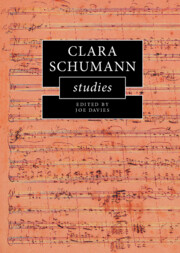Book contents
- Clara Schumann Studies
- Cambridge Composer Studies
- Clara Schumann Studies
- Copyright page
- Dedication
- Contents
- Figures
- Tables
- Music Examples
- Contributors
- Acknowledgements
- Introduction: Clara Schumann in the Musicological Imagination
- 1 Clara and Robert Schumann’s Circles in Dresden
- 2 Disillusionment and Patriotism
- 3 Softened, Smudged, Erased
- 4 A Way with Words
- 5 Clara Schumann and the Nineteenth-Century Piano Concerto
- 6 Clara Schumann and Bach
- 7 Formal Innovation and Virtuosity in Clara Schumann’s Piano Trio in G minor, Op. 17
- 8 Contextualizing Clara Schumann’s Romanzen
- 9 The Young Prophetess in Performance
- 10 Clara Schumann’s Compositional and Concertizing Strategies, and Robert Schumann’s Piano Sets
- 11 Clara: Robert’s Posthumous Androgyne
- 12 Clara Schumann, ‘Clara Schumann’ and the American Press
- 13 Clara Schumann’s Legacy As a Teacher
- Select Bibliography
- Index
9 - The Young Prophetess in Performance
Published online by Cambridge University Press: 25 November 2021
- Clara Schumann Studies
- Cambridge Composer Studies
- Clara Schumann Studies
- Copyright page
- Dedication
- Contents
- Figures
- Tables
- Music Examples
- Contributors
- Acknowledgements
- Introduction: Clara Schumann in the Musicological Imagination
- 1 Clara and Robert Schumann’s Circles in Dresden
- 2 Disillusionment and Patriotism
- 3 Softened, Smudged, Erased
- 4 A Way with Words
- 5 Clara Schumann and the Nineteenth-Century Piano Concerto
- 6 Clara Schumann and Bach
- 7 Formal Innovation and Virtuosity in Clara Schumann’s Piano Trio in G minor, Op. 17
- 8 Contextualizing Clara Schumann’s Romanzen
- 9 The Young Prophetess in Performance
- 10 Clara Schumann’s Compositional and Concertizing Strategies, and Robert Schumann’s Piano Sets
- 11 Clara: Robert’s Posthumous Androgyne
- 12 Clara Schumann, ‘Clara Schumann’ and the American Press
- 13 Clara Schumann’s Legacy As a Teacher
- Select Bibliography
- Index
Summary
In an 1835 review in the Leipziger Tageblatt, Robert Schumann pronounces the young Clara Wieck an ‘art-prophetess’, compares her to a ‘prophesying sibyl’ and describes the aspects of her tempestuous performance that provoke these impressions. While the image of the mature Schumann as prophetess or priestess is well established, the honorific is typically equated with her commitment to the Werktreue ideal and her artistic relationship with her husband. As ‘the priestess’, Schumann is understood to be devoted, dignified, self-denying, and nearly disembodied as a performer.
This chapter draws attention to the younger Wieck as a prophetess figure. Sources from the 1830s indicate that critics associate markedly different performance ideals with prophecy at this point in her career. In her youth, critics construct the musical prophetic as a mode of performance that relies on a strong demonstration of personality and a sense of abandon cultivated through an improvisatory character and bold physicality. By examining Wieck’s critical reception in the context of contemporaneous representations of sibyl-figures, most notably the artist-heroine of Madame de Staël’s Corinne, or Italy, this chapter suggests that, far from being self-denying, this image is used as a model of feminine ephemeral authorship.
- Type
- Chapter
- Information
- Clara Schumann Studies , pp. 187 - 201Publisher: Cambridge University PressPrint publication year: 2021
- 1
- Cited by

